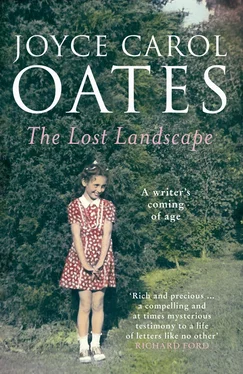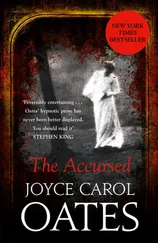If the little girl was inside the farmhouse, and heard a sudden squabble outside, a sign that someone or something was agitating the chickens, the little girl would run outside immediately to search for me. Oh oh oh—where is Happy Chicken?
The little girl knew about foxes and raccoons and stray dogs that might drag away chickens and devour them—(though it would be very unusual for any creature to make such a foray in daytime)—and so the little girl had to find me amidst the commotion, scoop me up in her arms and kiss the top of my head and smooth down my neatly folded wings and carry me quickly away promising that nothing bad would ever happen to Happy Chicken.
WE WERE RHODE ISLANDReds. Three dozen hens and a single rooster.
Other male chickens in the flock had been squashed as soon as it was evident that they were male . Our rooster had not a clue that he’d come close to oblivion. Or, our rooster had not a care that he’d come close to oblivion. Through the day Mr. Rooster strutted in the yard and roosted in the lowermost limbs of trees showing off his spectacular tail feathers, and the ruff around his neck; bristling red-brown, dark-red, yellow-red feathers that shone in the sun. Yellow-scaly legs, and nasty-sharp spurs just above the talon-claws. Though Mr. Rooster was as stupid as any hen pecking brainlessly in the dirt, or rolling in the dirt in the (mostly futile) effort of getting rid of mites, yet Mr. Rooster was fascinating to watch for you never knew what Mr. Rooster would do next. (You never knew what any hen would do next, but anything a hen can do is of so little significance there is no point in observing her.) Mr. Rooster could leap into the air fluttering his wings, for instance, and devour a dragonfly three feet above the ground, and Mr. Rooster could rush in a blind rage at an unsuspecting hen, or two unsuspecting hens, or, as if he’d only just thought of it, and now that he was doing it, it was a significant thing to do, throwing himself down and rolling over vigorously in the dirt until his gaudy feathers were dull with dust like those of an ordinary chicken.
Mr. Rooster gave no sign of knowing who I was—who Happy Chicken was! Ridiculous how this stupid bird seemed not to notice even as the little girl singled me out for special attention and treats in his very presence. (I’d have liked to think that Mr. Rooster was jealous of me, but the fact was, Mr. Rooster was too vain and too stupid for jealousy.)
That is, Mr. Rooster was indifferent to me unless I stepped brashly in his way, or failed to get out of his way quickly enough when he charged forward into the midst of the chickens at feeding time.
Sometimes for a reason known only to Mr. Rooster’s pea-sized brain he crowed loudly and irritably and flapped his wings in a show of indignation and flew clumsily to alight on a rail fence, like a person clumsily hauling himself up by a rope.
At dawn, Mr. Rooster woke everyone with his crowing. He was the first rooster to wake in all of Millersport—soon after Mr. Rooster crowed, you would hear roosters crowing at neighboring farms. No other rooster at any neighboring farm woke earlier than Mr. Rooster, and no other rooster crowed as noisily.
The hens took for granted that Mr. Rooster’s crowing tore a rent in the silence of the countryside-before-dawn that allowed the sun to appear. The little girl may have thought this also, but only when she was very little.
The Grandfather who took little interest in the chickens—(these were the Grandmother’s responsibility)—was yet proud of his goddamn bird . The Grandfather liked it that Mr. Rooster chased away other chickens and barn-cats who ventured too near and had to be disciplined.
How many dawns, the little girl was wakened by Mr. Rooster’s cries. Through her life to come, long after she’d grown up, and gone away from the farmhouse on Transit Road to live, she would wake to the faint, fading cry of a rooster just outside in the dark-before-dawn.
Is a rooster a harbinger of the Underworld? Does a rooster wake you so that you have no choice but to follow him into the Underworld?
After she’d become an adult older than the Mother and the Father of her early childhood, and the little scabs and scars caused by the rooster’s beak had long faded from her knees, frequently she would find herself touching her knees like Braille, when she was alone.
Very often, in bed. In the bright pitiless light of a bathroom she would examine her knees frowning and baffled, her childhood scars had so vanished as if they had never been . . . It is hard to disabuse yourself of the superstition that your skin is indelibly marked since childhood in a way known only to you.
Upsetting to remember how Mr. Rooster would single out a hen for no reason—(had she disrespected him? taunted him? dared to eat something meant for him?)—peck and jab at the terrified bird until she began to bleed, and chase her until she seemed to fall, or to kneel, before him. And then, Mr. Rooster might have mercy on her, and strut away. But a scab would form shiny and bright as a third eye on the hen’s head, that would attract the attention of another hen, and so soon—for some reason—(the little girl could not understand this, it frightened her very much)—this hen would peck at the afflicted hen, and soon another hen would hurry over to peck at the afflicted hen, and another, and another; and sometimes Mr. Rooster, attracted by the squawking, might return for the coup de grâce —a series of rapid beak-stabs until the poor afflicted hen was bleeding, fallen over and unable to right herself beneath the frenzy of stabbing beaks . . . And hearing the barnyard commotion the Grandmother would hurry out of the house scolding and shooing with the intention of rescuing not the struggling live hen but the limp hen-corpse for the Grandmother’s own purposes.
In her harsh guttural speech the Grandmother would curse the chickens and the rooster. Much of the Grandmother’s speech had a sound of chiding and cursing. And the Grandmother would take up the limp blood-dripping hen-corpse into the kitchen and boil a pan of water on the stove and drop the hen-corpse into it, so that the feathers could be plucked more easily.
At these times the little girl had run away and hid her eyes.
The Mother would say to her, Don’t pay any attention, help me in the kitchen, sweetie!
Mostly the little girl would not remember such things. The little girl’s memory of the farm on Transit Road was very selective like the colander into which the Grandmother dumped boiling water containing her thin-cut noodles, made out of the Grandmother’s noodle-dough, that trapped just the noodles but strained away the liquid.
In later years recalling with a fond smile very little of the farm, the barnyard, the flock of Rhode Island Reds—just, me.
THE LITTLE GIRL WASso excited! She was five years old.
This was the summer the little girl was allowed to help the Grandmother collect eggs from the hens’ nests in the chicken coop (where the chicken droppings were so smelly, you had to hold your breath especially after a rain) and soon then, the little girl was allowed to feed the chickens by herself, twice a day, their special chicken-feed. Like tiny pebbles the chicken feed seemed to the little girl, seized in handfuls to toss to the chickens; to get the seed you lowered a tin pie pan deep into the feed-sack, itself contained inside a larger, canvas sack to keep out rats and mice.
So exciting! Almost, the little girl wetted her panties, with anticipation.
And when she began to call to the chickens in her high, quavering voice as the Grandmother had taught her— CHICK!-chick-chick-chick-chick-CHI-ICK! —chickens came rushing in her direction at once, and made the little girl feel very special—very powerful . It was not ever the case that the little girl felt powerful —nor could the little girl have defined the sensation, at the time; but calling CHICK!-chick-chick-chick-chick-CHI-ICK provoked such a feeling in her, set her heart to pumping and a warm, rich sensation coursing through her veins, the little girl felt very special, and very proud.
Читать дальше












